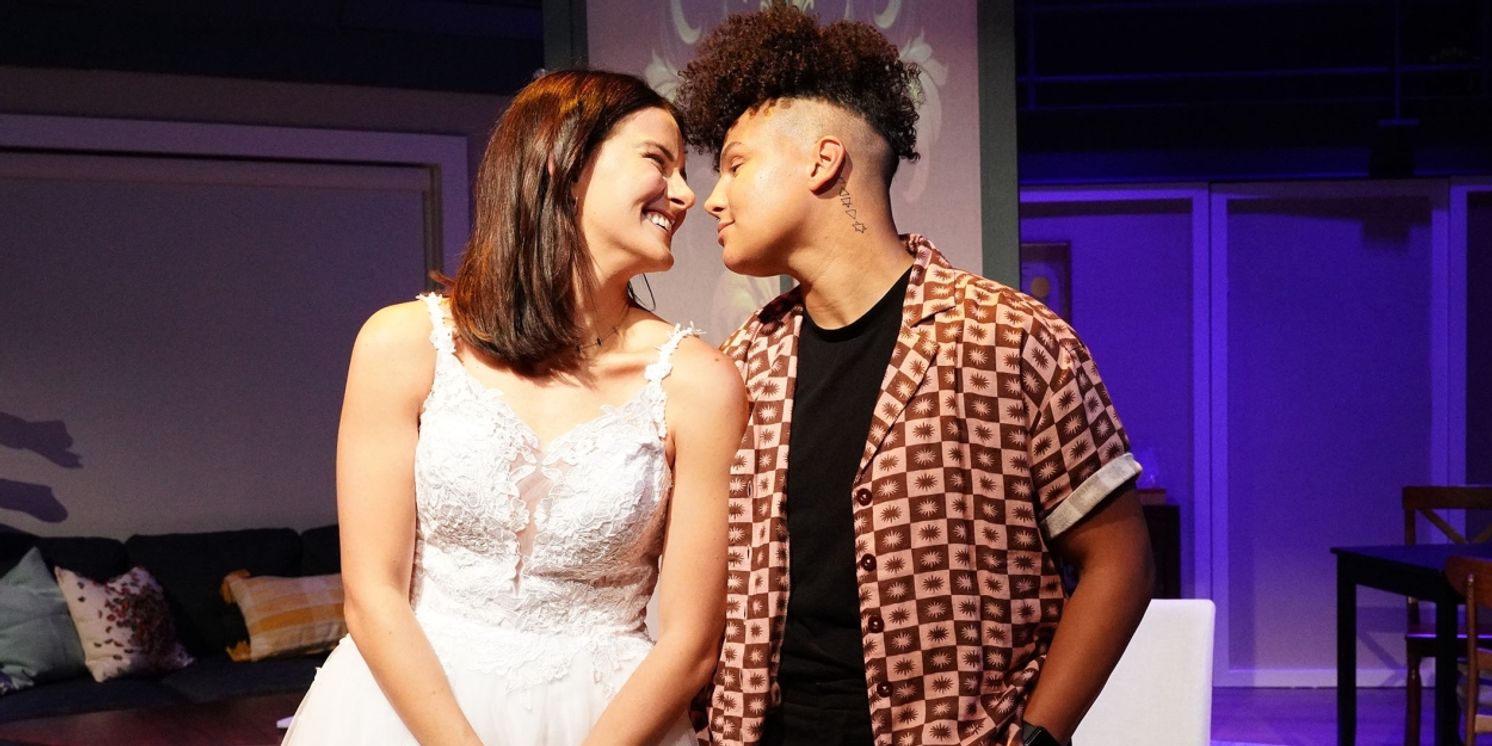Review: BISEXUAL SADNESS at Road Theatre
Plenty to talk about from latest Road World Premiere

By its very title, BISEXUAL SADNESS plays and feels like it should be the topic of a seminar or an article in a clinical journal, maybe even the theme of a discussion group. Which is, in a lot of ways, how India Kotis’s play comes across in its world premiere at the Road Theatre: as a topic in search of a dramatic arc. It feels decidedly odd to say this about an experience in which so many of director Carlyle King’s performers are acting their guts out, distracting from – rather than serving – the struggles of the central character, the only person in this not-exactly-a-play that we should be caring about
That’s Faye, a doctor in her 30s, formerly in a relationship with a woman, and now engaged to a man, a pre-school teacher names Alex whom she (and everybody around her) adores. But by entering into a binding heterosexual relationship, Faye believes she is sacrificing a part of her identity. Her younger self pictured herself falling in love with and marrying a woman. That she’s ending up with a man is not “settling,” exactly, or so Faye insists, but she can’t wrestle the idea into submission. So that’s what she spends the 80 minutes of BISEXUAL SADNESS trying to do. Given how much we want to care about Faye and how largely uninvolving the other characters are, I wondered how BISEXUAL SADNESS might have played as a solo performance.
Faye’s struggle plays out in a series of scenes prior to her wedding date. She tries on a dress, she samples cake with her sister. She has a heart-to-heart with her newly non-binary identifying niece while they are cutting paper flowers. The wedding – and certainly her conundrum – should be every inch all about Faye. But the intrusion of other people and their problems muddy the waters forcing Faye to be present for other people who can’t (or won’t) understand what she’s experiencing. Given the emotional neediness of these people (primarily members of her family), Faye can never fully be the star of The Faye Show until the end of the play when she gets a scene with her fiancé, and the two of them open up. “There’s this grief, this palpable grief,” Faye tells Alex whose patience and understanding is more than any human being deserves.
“So then don’t flippin’ do it!” one has the not infrequent urge to scream from the audience. “Don’t get married. Keep things as they are. Seek therapy. Talk it out. Figure out a way to be bisexual, and not be sad!” Alex says none of these things. He, much like the play itself, embraces the uncertainty and ambiguity of what lies ahead. Because, to him, that’s the deal when it comes to being in love with someone.
Kotis’s play operates from the principle that Faye believes her situation is entirely unique to her, and therefore that nobody could possibly understand what she is experiencing. And indeed, we are right there with Tiffany Wolff’s Faye as she tries so hard to hold it together, to do right by other people. The character is a doctor who “should have been a pediatrician.” People are continuously reminding her of this, implying that she’s already out of place, occupying the wrong space. Genevieve (Alaska Jackson), Faye’s former partner, now her supportive best friend, gets her, but also calls Faye out on her BS. They are still so close that they use their endearments on each other. Their scenes together are the most authentic feeling of the play, largely thanks to the push-pull electricity between Wolff and Jackson.
More problematic are the interactions between Faye and her family, which already suffer from narrative contrivance. Faye’s older sister Miranda (Karrie King) has recently been dumped by her husband for a younger woman. She lands on Faye and Alex’s doorstep with her 13-year-old daughter Naomi (Gloria Ines) who is A. non-binary, B. possibly attracted to girls and C. could use benefit from a sounding board who isn’t their falling apart mother. King’s wise-cracking neuroticism, while certainly a laugh-generator, feels over the top, and Ines’s squirmy anxiousness isn’t far behind. Aunt and niece share a tricky “cards on the table” encounter in which Faye shows how ill-equipped she is to deal with anyone’s problems other than her own. The play makes a big deal over people – Miranda in particular – messing up Naomi’s pronouns.
The final character of BISEXUAL SADNESS is Lillian (Andrea Flowers) Genevieve’s girlfriend (but not their primary partner). Lillian is an aerialist, a free spirit who embraces absolutely everyone. Not exactly sure what she’s doing in this play other than to blitz in and out of a dinner party, fly her uniqueness flag and catch Miranda using the wrong pronouns, but Flowers does all of these things with plenty of charm.
The production is double-cast with the above-reviewed Vincent cast alternating with the Roxane cast: Liz Fenning, Bex Taylor-Klaus, Philip Smithey, Amy Tolsky, Naomi Rubin and Samira Beija.
Bisexual Sadness plays through November 5 at 10747 Magnolia Blvd., North Hollywood.
Photo of Tiffany Wolff and Alaska Jackson by Peggy McCartha.
Reader Reviews
Videos

